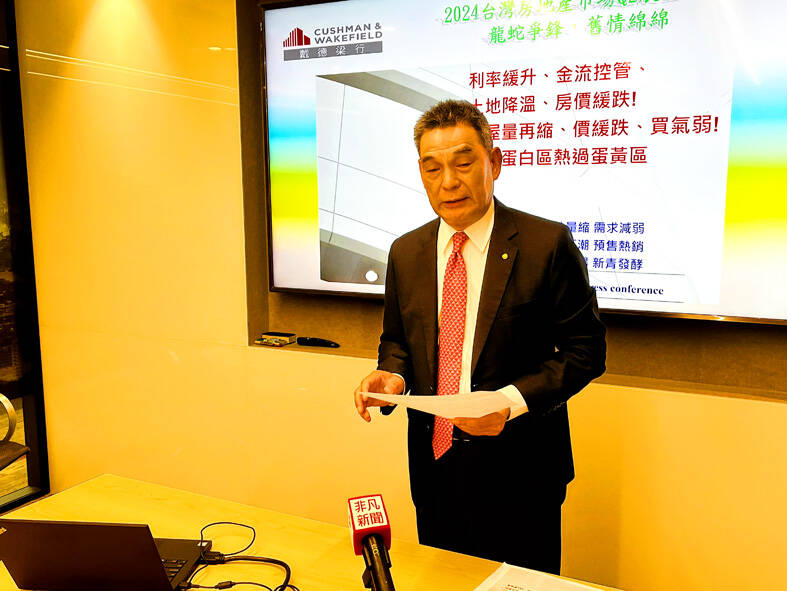Commercial property transactions last quarter spiked 51.5 percent year-on-year to NT$21.2 billion (US$662.94 million), driven by strong demand for office buildings from different sectors, property broker Cushman & Wakefield Taiwan said yesterday.
Power supply and electronic components maker Delta Electronics Co (台達電) bought two office buildings in Taipei’s Neihu District (內湖) from Nan Shan Life Insurance Co (南山人壽) for NT$4.79 billion to meet self-occupancy needs, making it the largest deal in the quarter, the broker said.
Goldsun Building Materials Co (國產建材) sold a commercial complex in Tainan for NT$1.64 billion, the second-largest transaction, followed by the acquisition by Taishin Life Insurance Co (台新人壽) of an office building in Tainan for NT$1.45 billion, it said.

Photo: Hsu Yi-ping, Taipei Times
Strong office demand and ample liquidity accounted for the impressive showing in the commercial property market, Cushman & Wakefield Taiwan said, adding that self-occupancy demand would continue to drive the market this quarter and beyond.
Land deals totaled NT$63.7 billion during the first quarter, above NT$60 billion for the first time since 2022, suggesting the market is emerging from selective credit controls and other unfavorable policy measures, the broker said.
It was a stark contrast to the average of NT$30 billion a quarter last year, it said.
As for residential property, Cushman & Wakefield Taiwan managing director Billy Yen (顏炳立) said the government’s interest subsidy for first-home purchases and Taiwan Semiconductor Manufacturing Co’s (TSMC, 台積電) capacity expansion have lent support to the segment.
Presale projects have proved popular in locations near TSMC’s new plants nationwide, as the plants create well-paid jobs for people with real housing demand, Yen said.
Separately, property transactions in the nation's six special municipalities climbed to 23,409 units last month, rising by 12.2 percent from a year earlier, as the government's interest subsidy spurred sentiment among first-home buyers and people’s attitude toward real-estate market turned more positive, data compiled by local land administration agencies showed yesterday.
Among the six special municipalities, transactions in Taipei jumped the most by 34.9 percent to 3,042 units and Tainan surged 32.7 percent to 2,894 units, while Taoyuan rose 16.9 percent to 3,970 units and Kaohsiung increased 11.5 percent to 3,839 units. New Taipei City saw transaction grow 2.4 percent to 5,671 units but Taichung witinessed a decline of 1.3 percent to 3,993 units, data showed.
Overall, total transactions in the six cities during the first quarter increased 28.3 percent from a year earlier to 63,226 units, data showed.

Taiwan will prioritize the development of silicon photonics by taking advantage of its strength in the semiconductor industry to build another shield to protect the local economy, National Development Council (NDC) Minister Paul Liu (劉鏡清) said yesterday. Speaking at a meeting of the legislature’s Economics Committee, Liu said Taiwan already has the artificial intelligence (AI) industry as a shield, after the semiconductor industry, to safeguard the country, and is looking at new unique fields to build more economic shields. While Taiwan will further strengthen its existing shields, over the longer term, the country is determined to focus on such potential segments as

UNCERTAINTY: Innolux activated a stringent supply chain management mechanism, as it did during the COVID-19 pandemic, to ensure optimal inventory levels for customers Flat-panel display makers AUO Corp (友達) and Innolux Corp (群創) yesterday said that about 12 to 20 percent of their display business is at risk of potential US tariffs and that they would relocate production or shipment destinations to mitigate the levies’ effects. US tariffs would have a direct impact of US$200 million on AUO’s revenue, company chairman Paul Peng (彭雙浪) told reporters on the sidelines of the Touch Taiwan trade show in Taipei yesterday. That would make up about 12 percent of the company’s overall revenue. To cope with the tariff uncertainty, AUO plans to allocate its production to manufacturing facilities in

COLLABORATION: Given Taiwan’s key position in global supply chains, the US firm is discussing strategies with local partners and clients to deal with global uncertainties Advanced Micro Devices Inc (AMD) yesterday said it is meeting with local ecosystem partners, including Taiwan Semiconductor Manufacturing Co (TSMC, 台積電), to discuss strategies, including long-term manufacturing, to navigate uncertainties such as US tariffs, as Taiwan occupies an important position in global supply chains. AMD chief executive officer Lisa Su (蘇姿丰) told reporters that Taiwan is an important part of the chip designer’s ecosystem and she is discussing with partners and customers in Taiwan to forge strong collaborations on different areas during this critical period. AMD has just become the first artificial-intelligence (AI) server chip customer of TSMC to utilize its advanced

Chizuko Kimura has become the first female sushi chef in the world to win a Michelin star, fulfilling a promise she made to her dying husband to continue his legacy. The 54-year-old Japanese chef regained the Michelin star her late husband, Shunei Kimura, won three years ago for their Sushi Shunei restaurant in Paris. For Shunei Kimura, the star was a dream come true. However, the joy was short-lived. He died from cancer just three months later in June 2022. He was 65. The following year, the restaurant in the heart of Montmartre lost its star rating. Chizuko Kimura insisted that the new star is still down